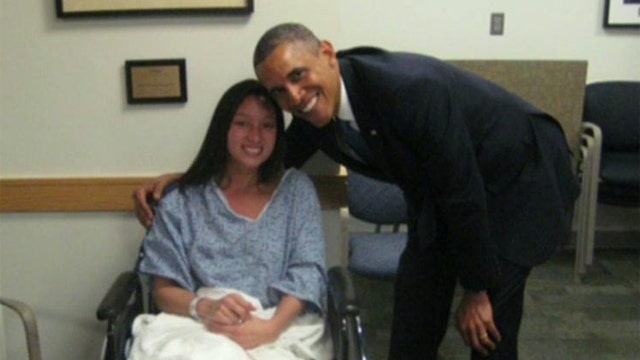Her name is Kaitlynn Cates, and she is a 25 year old woman who was standing at the finish line of the Boston Marathon two weeks ago when the first bomb went off, blowing her into the air and damaging her right leg.
She told me she was bleeding profusely and she thought she might not survive. Then her friend Leo took off his T-shirt and used it to put pressure on the wound, stopping the bleeding as he lifted her into his arms and carried her to his car. From there he drove her the wrong way down one way streets to Massachusetts General Hospital.
It is a storybook tale that will have a happy ending even amidst the fear and dark feelings that the terrorists have elicited in all of us. “I never looked back,” she said to me, almost biblically. “I’m definitely going to rise above this. There’s always going to be a scar. But I’m not going to let them win. I’m not going to let them stop me from living a normal, healthy, happy life.”
I spoke with Kaitlynn in her room at the hospital with Leo by her side and found her to be upbeat, strong, and looking forward to a complete recovery.
Unfortunately, not all of the survivors of the tragedy are as fortuitous, and for many it will be many months of agonizing physical and psychotherapy before they achieve what doctors call “the new normal.”
[pullquote]
Kaitlynn was already thinking clearly and purposefully in her hospital room, but the most underreported story following the Boston Marathon bombings are likely to be Traumatic Brain Injury and Post-traumatic Stress Disorder, which will surface in the months to come.
Many patients who injured their brains from the blast don’t know it yet. There is an epidemic (close to half a million patients) among veterans of the wars who are suffering from TBI or PTSD.
Dr. David King, top trauma surgeon at Massachusetts General Hospital who served in Iraq, ran in the Marathon, finished in three hours, and then turned right around and began operating on survivors at the hospital. For those who suffered shrapnel wounds, King and others were able to save their legs through multiple operations.
King told me that almost all the patients who didn’t require amputations initially won’t need them now thanks to the latest surgical techniques though they will require extensive rehabilitation. He said that more than a decade of war have led to all major trauma surgeons being familiar with these new methods.
A good treatment for all the fear and worry in America right now because of the terror attack and concern over future attacks is to focus on a story of courage and hope like Kaitlynn Cates’ and a story of commitment and skill like Dr. King’s.
In the end, the American spirit still has the power and the flexibility to overcome terror in all its guises.









































